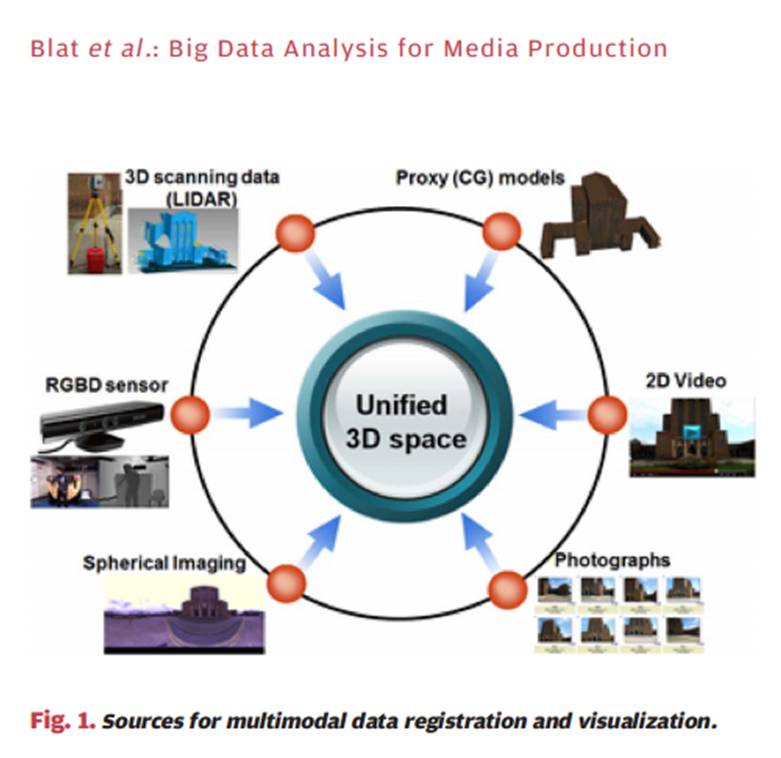Publication of the results of IMPART, a digital cinema project led by the Interactive Technologies Research Group
Publication of the results of IMPART, a digital cinema project led by the Interactive Technologies Research Group
Josep Blat was the principal investigator of this project of the EU 7th Framework Programme, the main contributions to which have been published in the Proceedings of the IEEE, the highest impact journal in the field of electronics and computational sciences.
The Proceedings of the IEEE, the highest impact general interest journal in the field of electronics engineering and computational sciences, has published the work “Big Data Analysis for Media Production”, within the special issue of Big Data: Practical Applications.
The article contains the main results obtained in the digital cinema project IMPART (acronym of Intelligent Management Platform for Advanced Real-Time mediaprocesses), a project of the EU's 7th Framework Programme that was led by Josep Blat, professor at the Department of Information and Communication Technologies (DTIC) of UPF and which began on 1 November 2012 with a duration of 36 months. It has had a budget of €3.6 million. Co-authors of the work are: Josep Blat and Alun Evans, coordinator and researcher, respectively, of the Interactive Technologies Research Group (GTI) at UPF.

The film industry generates some 20 terabytes of data each day of filming. Each film uses multiple cameras as well as information from different sources (3D laser scans, spherical captures, 3D graphics, etc.). The main contributions of the project have been in the field of monitoring and the quality assurance of multicamera setups, multisource registration and acceleration of 3-D reconstruction, anthropocentric visual analysis techniques for semantic content annotation, and integrated 2D–3D web visualization tools.
As a result of the IMPART project the researchers have obtained a series of data of multisectoral film production, in addition to improvements in the basic techniques of acceleration, grouping and viewing necessary to cope with the sheer amount of data generated by the various sources of information used in the post-production of a film and that can be applied in other areas that also have to process large amounts of data.
As Josep Blat, principal investigator of the project, states, “these research results have a highly practical impact on film production. For example, by going from days to hours to integrate data and to do so with better quality, as has been achieved, can mean very considerable savings in renting equipment or salaries”.
The IMPART consortium enjoyed the academic participation of the Centre for Vision, Speech and Signal Processing, of the University of Surrey (United Kingdom); the Department of Computer Graphics and Multimedia, of the Brno University of Technology (Czech Republic); the Computer Science Department of the Aristotle University of Thessaloniki (Greece); in conjunction with British companies FilmLight, winner of several Oscars in technology, and Double Negative Ltd., one of the most important digital effects companies in Europe that has received numerous awards for visual effects for such films as Inception (Oscar and BAFTA) or Harry Potter and the Deathly Hallows Part 2 (BAFTA).
The IMPART project has continued within the Interactive Technologies research group (GTI) with regard to research into digital cinema and in collaboration with key European companies. This research activity has been preceded by European projects also coordinated by the GTI such as Speed-FX, IP-RACINE, and iMP, now since 2002, a well-established line of research that, presumably, will continue in future projects.
Reference work:
Josep Blat, Alun Evans, Hansung Kim, Evren Imre, Lukàš Polok, Viorela Ila, Nikos Nikolaidis, Pavel Zemčík, Anastasios Tefas, Pavel Smrž, Adrian Hilton, Ioannis Pitas (2016), “Big Data Analysis for Media Production”, in: Big Data: Practical Applications, Proceedings of the IEEE , 11, Nov. 2016, pages 2085 – 2113.
